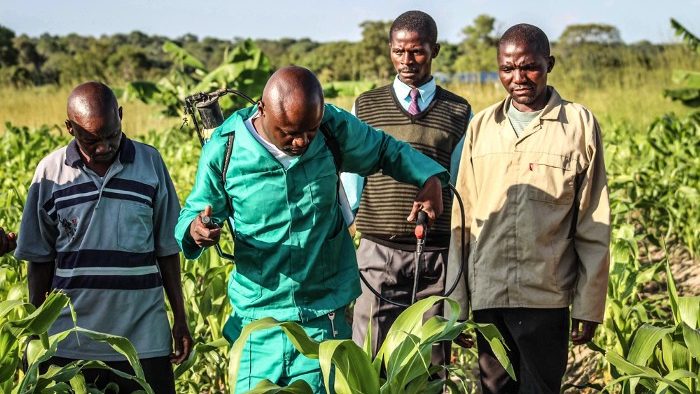Sustainable and environmentally-friendly pest control could save billions of tonnes of crops every year.
GCRF-AFRICAP researchers Dr Steve Sait and Dr Stephen Whitfield ask: how can we help farmers get fair access?
Fall armyworm can devastate a field of maize. The pest — a moth — arrived in Africa from its native USA in 2016 and is now found throughout the continent.
Its caterpillars feed voraciously on the foliage of over 350 plant species. These include the food crops on which 175 million smallholder farmers in sub-Saharan Africa depend, such as rice, sorghum, wheat, vegetable crops and especially maize.
Estimates vary but fall armyworm is thought to cause the loss of between 8–20 billion tonnes of maize each year across the continent.
The benefits of biological controls
As with most crop pests, chemical pesticides exist to treat fall armyworm. But most African farmers simply can’t afford them and they aren’t a sustainable solution. Pesticides kill other, more beneficial species and eventually the pest builds up resistance.

A better option is to use biological control methods, such as companion planting that diverts the pest away from the crops, or biological pesticides such as bacteria, fungi or viruses, that will kill the pest and control its numbers.
But looking at scientific options can only provide part of the solution, as Dr Steve Sait and Dr Stephen Whitfield from the University of Leeds know only too well.
They are both part of GCRF-AFRICAP, a four-year research programme to make agriculture and food production in sub-Saharan Africa more productive, sustainable and resilient to climate change.
Funded through the Global Challenge Research Fund, AFRICAP works with farmers, local and national governments to build an evidence base — in soils, plants, livestock, ecology and meteorology — to develop new policy and put that into practice to create real change. Because this joined up approach requires a mix of skills, the programme brings together researchers from across the natural, social and political sciences.
Why pesticides are only part of the picture
Drawing on their experience in AFRICAP and earlier projects, the two researchers — one a biologist, the other a social scientist — are part of a team working together to tackle these challenges. This means not simply developing biological control approaches for the fall armyworm and other crop pests, but also addressing the issues that could affect their uptake.
